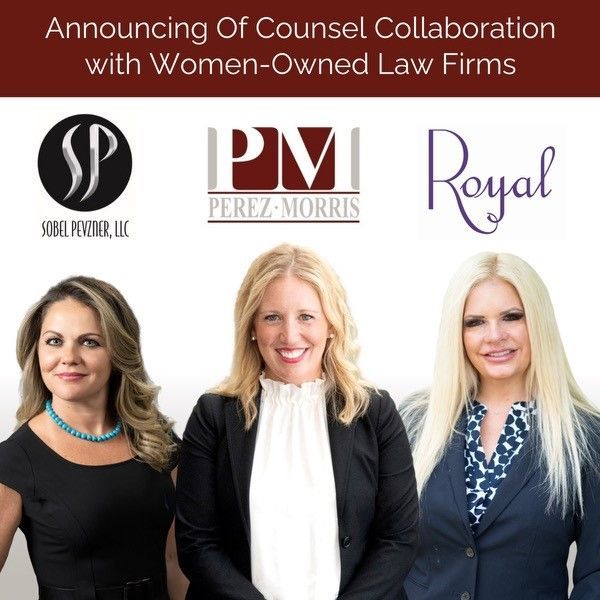The Royal Law Firm Announces Of Counsel Collaboration with Women-Owned Law Firms

The Royal Law Firm has joined a unique collaboration of women-owned law firms, in a continued expansion of its New England and New York Metropolitan area footprint for providing exceptional litigation defense and advice to business clients.
The Royal Law Firm has entered into an Of Counsel agreement with two other women-owned law firms: Perez Morris and Sobel Pevzner, LLC. This Of Counsel collaboration further bolsters The Royal Law Firm’s labor and employment law, business litigation, workers’ compensation and transactional practices and extends the firm’s reach into new jurisdictions including OH, PA, and NJ.
Through these strategic relationships, Royal can leverage the deep experience of these women-owned firms for the benefit of the clients. Likewise, by sharing resources, each firm in the collaboration will be able grow its practice area and geographic coverage. This collaboration will also enable new opportunities for clients to increase their diverse legal spend with women-owned law firms.
The Royal Law Firm’s client relationships will continue to be managed by the firm, with integrated billings. All of The Royal Law Firm’s rate structures and client agreements will remain the same. The goal is a seamless expansion of the firm’s bench, with the top quality service and case administration our clients have come to expect. The collaborating firm’s attorneys are seasoned counsel in their jurisdictions and will share knowledge and resources such as forms, best practices and office space for witness interviews, depositions, mediations and other needs.
About our Collaborators:
Perez Morris is a women-owned business law firm with offices in OH, PA, NY, NJ, CT, and MA, and attorneys licensed to practice across the country. The firm guides its business clients to manage their risks and make deals happen. The firm’s attorneys provide general counsel, business litigation, medical malpractice, pharmacy liability, and commercial transactional services nationwide with a focus on cost-effective, practical, industry-savvy advice that allows its clients to continue to grow and thrive.
Sobel Pevzner, LLC, is a woman-owned defense firm serving clients in New York, New Jersey and Eastern Pennsylvania, which, for more than 25 years, has been engaged in all aspects of negligence defense litigation. Since its inception, the firm has consistently and successfully represented prominent members of the insurance, hospitality, retail, transportation, habitation and construction industries in the greater New York Metropolitan area. The firm remains committed to providing the highest quality defense in the most cost effective manner. Managing Partner Bella Pevzner has significant experience in the defense of civil lawsuits as well as workers’ compensation matters in NY and NJ and oversees the day-to-day operations of the firm’s NY and NJ offices.







